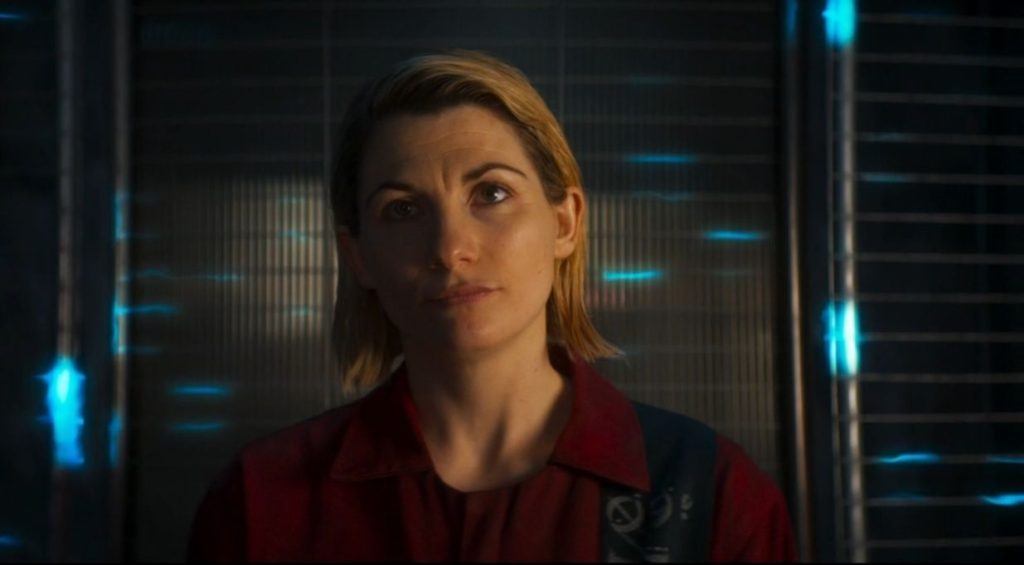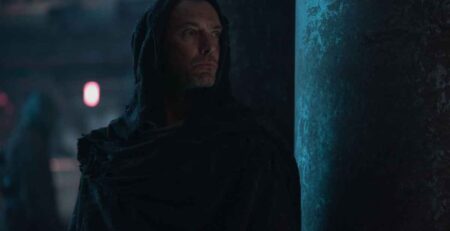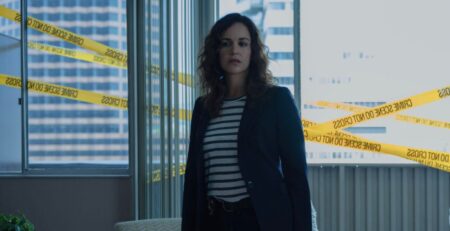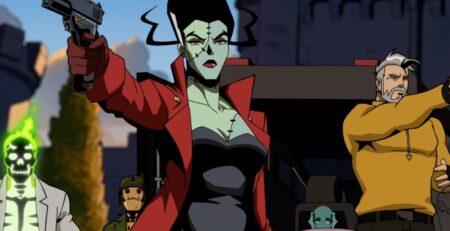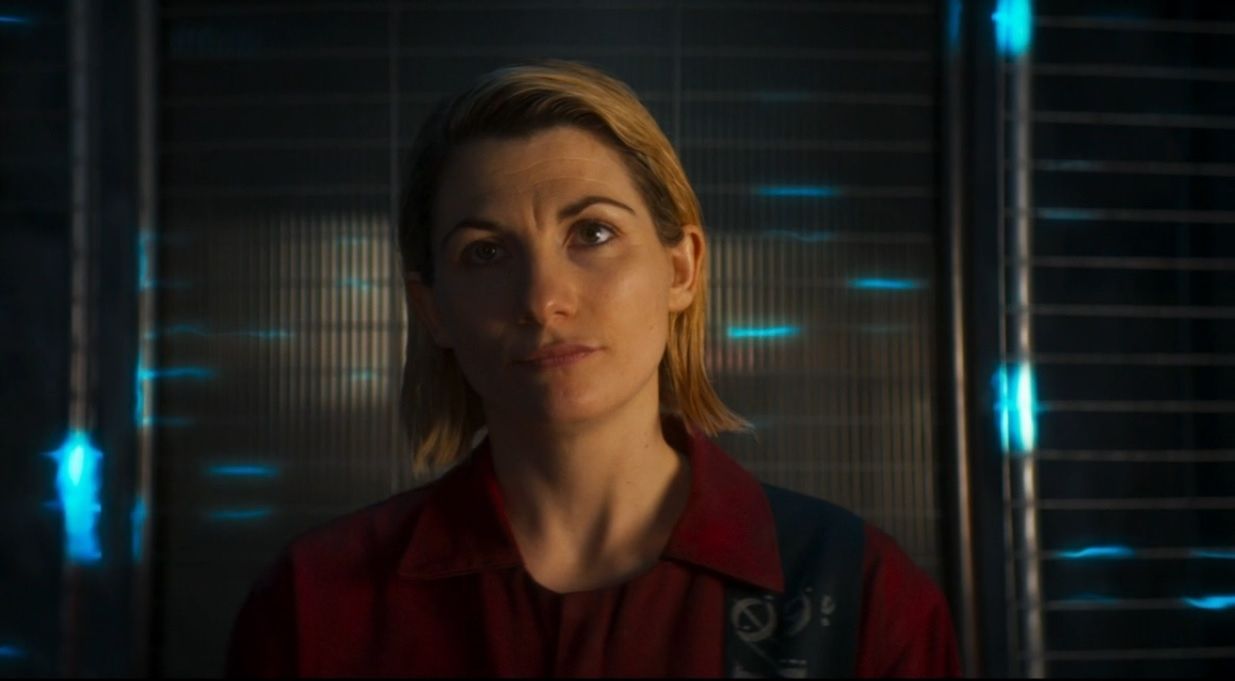
“Revolution of The Daleks” is a New Year’s Day episode of the BBC sci-fi Doctor Who, written by Chris Chibnall and directed by Lee Haven Jones. Doctor Who was created by Sydney Newman, with the current showrunner being Chibnall. The show currently stars Jodie Whittaker as the title character, with Tosin Cole, Mandip Gill, and Bradley Walsh acting as her companions.
At the end of the last season, the Doctor sent her companions, Ryan (Cole), Yaz (Gill), and Graham (Walsh), back to Earth, planning to sacrifice herself to defeat the Master and the Cybermen. Despite surviving her ordeal, the Doctor was captured by the Judoon and locked away in a maximum-security prison.
The episode starts just after the ending of the last New Year’s Day Special, in which the Doctor and her companions battled and destroyed a Dalek trapped on Earth for centuries. Though the actual creature is believed dead, there is still a destroyed casing left behind. The Dalek’s armour is stolen by Jack Robertson, a billionaire who wants to become the United States president. He plans to repurpose the Daleks into weapons for security forces, sold at a profit, of course. But the alien itself may not be as dead as they believed…
Meanwhile, in the intergalactic prison, the Doctor is rescued by an old friend, Captain Jack Harkness (John Barrowman). Jack and the Doctor head back to Earth, beaming as they exit the Tardis. But the Doctor misjudged the time of arrival. She’s been gone for ten months, and her friends believed she died.
The plot of “Revolution of the Daleks” is fantastic in its concept. The sci-fi elements follow straight on from “Resolution,” the episode that preceded it 12 months ago. It utilizes a theme that has been ever-present within Chibnall’s era of the series, that humans often lead to their own downfall through greed or ignorance. While the Daleks are the true evil within the episode, their resurgence was helped by Robertson and his employees. The Doctor’s return feels earned and justified, providing drama when she realizes the damage caused by leaving her companions behind.
Several sub-plots of the last season were paid off early, allowing the main story to take over. While there are scenes used to reflect on huge revelations that the Doctor has discovered, the episode’s quick pace rarely slows. The action is exciting, with unexpected twists happening frequently. The Doctor’s plan for defeating these new Daleks is clever and dangerous simultaneously, as they nearly always are.
There is also a surprise departure from major cast members, which may spark mixed feelings. Their presence in the episode didn’t feel like it was a swan song for them. But the final scene of the episode is beautiful, connecting to the first episode of season 11. The dialogue in that last 5 minutes is stunning. However, if this is the last we see of them, then it could arguably be a disappointing departure. I don’t think either character was fully finished within the series.
Yaz is superb within this episode. She is probably most like the Doctor in character out of the three. For the ten months that they are stuck on Earth, with nothing but a disused TARDIS as a base, she keeps looking for her friend. She shows her fury when the Time Lord actually appears in front of her. She’s never afraid of questioning the Doctor, and her trust has been damaged now.
Captain Jack is a welcome sight for sore eyes. Barrowman slips back into that role naturally. The energy, the charm, the cheesiness, all returns. His appearance serves as more than just fan service, too, as he is a brilliant option to speak to Yaz after the Doctor abandoned them. He has experience traveling in the TARDIS, also knowing what it is like to be left behind. The scene between them is emotional and well scripted. That being said, there were times when it felt like Jack disappeared from the episode entirely and didn’t always felt like he was needed.
Whittaker’s performance as the Doctor is always terrific. Ever lively and captivating, she shows how the main character can lead a show with positivity. But there is also that anger that resides in the hearts of all iterations of the Doctor, tainted by years of facing evil. The response to huge changes in the Doctor’s lore has weighed on her, evident in Whittaker’s eyes when she’s alone. The prison scenes are fantastic for longtime Whovians, as there are multiple references and cameos by some of the Doctor’s past enemies.
The Daleks are back. One of the most iconic villains of all time, the word “exterminate” spoken through Nicholas Briggs’ voice will always send a shiver down the spine. Their tenacity to survive is prevalent at all times. Robertson (Chris Noth) as a secondary villain is both fun and ridiculous. An obvious parody of a certain outgoing president is clear; he has a longing for power and status that jeopardizes everything within a hundred-mile radius of him.
The dialogue is occasionally long-winded, but for the most part, brilliant. Some of the jokes are intentionally bad, but the Doctor often uses these to disarm a room full of tension or threat. Chibnall’s humour is smirk-inducing, as seen by the text at the beginning of the episode. When needed, the dialogue comes across as natural, fluid, and considered.
“Revolution of the Daleks” is a terrific episode. The Doctor versus the Daleks is always a spectacle to enjoy. Daleks have been used by humans before in “Victory of the Daleks,” but the continuation from last year’s special was a clever way to start the episode. And beyond that opening, the story takes new and unexpected turns. Despite the script and ending’s weakness, the rest of the special’s elements support the plot. The chemistry between the cast is always a pleasure to witness, even if it may never be the same again in the future. But if Doctor Who teaches us one thing, it is that change is a good thing.
“Revolution of the Daleks” can be watched on HBO Max and BBCiPlayer for British audiences.
"Revolution of the Daleks" Doctor Who New Years Day Special
-
Rating - 7.5/107.5/10
TL;DR
“Revolution of the Daleks” is a terrific episode. The Doctor versus the Daleks is always a spectacle to enjoy. Daleks have been used by humans before in “Victory of the Daleks,” but the continuation from last year’s special was a clever way to start the episode. And beyond that opening, the story takes new and unexpected turns. Despite the script and ending’s weakness, the rest of the special’s elements support the plot. The chemistry between the cast is always a pleasure to witness, even if it may never be the same again in the future. But if Doctor Who teaches us one thing, it is that change is a good thing.

